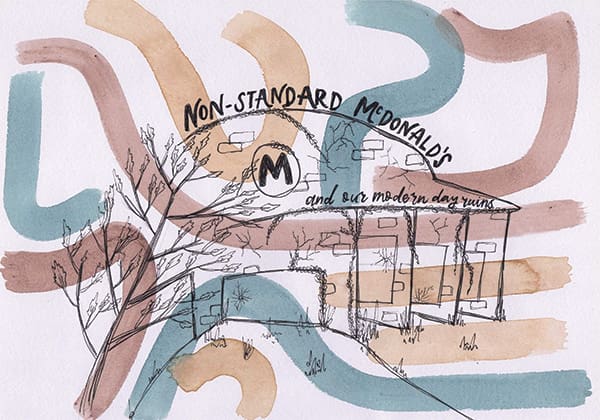While doom-scrolling in lockdown, one thing that always catches my eye and piques my interest are non-standard McDonald’s, and I have become obsessed with finding out about as many obscure ones as I can. The famous twitter account @nonstandardmcd was the progenitor to this fascination, as it’s dedicated to logging a range of uniquely styled McDonald’s restaurants all around the world; from astronaut McDonald’s, brutalist McDonald’s, and the McSki McDonald’s. I was delighted to find out last year that Sydney Uni had a non-standard McDonald’s of its own, called The Corner McCafe. Sadly, like many businesses in Sydney, it now sits boarded up and closed forever.
Unlike many other non-standard McDonald’s, which usually owe their unique designs to individual managers choosing to style their restaurants any way they like, The Corner McCafe was a wholly unique entity. Designed as a way to tap into the special preferences of the Inner West, the standalone cafe offered customers a wide variety of healthy food options and taste sensations. They swapped out Big Macs and chicken nuggets for corn fritters, avocados, quinoa, and brioche buns! All the while served on wooden boards by inner city millennials wearing brown faux-rustic aprons. As unique as this was, McDonald’s claimed that the experiment failed to generate enough revenue to warrant expansion, and closed its doors for good in October of last year.
The Corner McCafe became a regular landmark on my walk to classes in the second semester of last year when I was thankfully allowed on campus once again. Just on the outskirts of the University, hidden between the Charles Perkins Centre and St. John’s College sat the quaint dining experience. The McCafe was a bustling communal space where everyone would meet in perfect synchronicity, from doctors just off their shifts at the Royal Prince Alfred Hospital, to Uni students heading to their seminars and lectures, and the many poor and destitute looking for shelter. The open outdoor seating area, with an absence of anti-homeless architecture and a shady covering protecting people from the elements, facilitated this cosmopolitan melting pot of people, with everyone sipping coffee and having lively chats amid the marijuana scented smog that enveloped the area.
It is sad thinking about what was lost, that electricity that buzzed in the air, and the sense of solidarity despite the corporate conceit of its inception. Obviously, the loss of a McCafe is not the worst thing in the world, but rather what it represents. And with non-standard McDonald’s closing all over the world, along with many businesses in general shutting their doors, one must wonder what relics and ruins this era of humanity will leave behind.
While relics are often imagined as the royal palaces of 15th century kings and queens, one can also find wonder in the exploration of abandoned shopping centres, hospitals, and other spaces of urban decay. The key differences between these places, besides the notable temporal separation, is a stark one. While roaming the halls of royal palaces and museums allows these figures to hold on to their power in a way that extends beyond their lives and into death, the act of urban exploration is never tailored to any particular people but rather general places, ones that would be very uninteresting to visit if not abandoned to time. The sense one gets from urban exploration that they don’t get from museums or palace tours is a sense of ‘lived in-ness’, the feeling of historical hustle and bustle that something like a hospital or school provides but the living quarters of a feudal Baron does not.
I imagine in some far off dystopian future, or even some fast emerging present, people exploring these defunct McDonald’s restaurants and being in these spaces, with the energies of a thousand lives and voices flowing through them.
McDonald’s is a massive corporation, with restaurants all around the world, and is a fixture of everyone’s lives in some way or another. As with many companies, it is exploitative in that it benefits from the worst aspects of modern day capitalism. I hope, however, that the executives at McDonald’s can become humbled by the prospect of scavengers, in some dystopian hellscape, sifting through the ashes and finding what remains of the Corner McCafe. They will not think about McDonald’s and its vast wealth and power, but rather the people who walked through its doors and filled its spaces.
My name is Ozymandias, King of Kings;
Look on my Works, ye Mighty, and Despair!
– Percy Bysshe Shelley (1792-1822)





